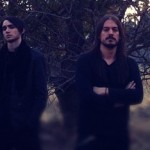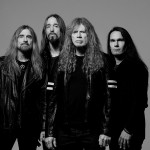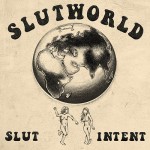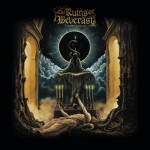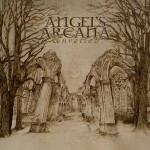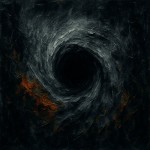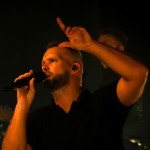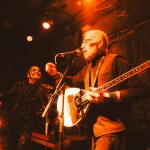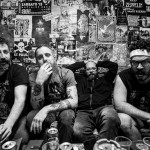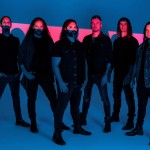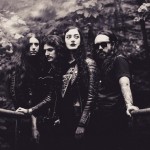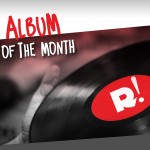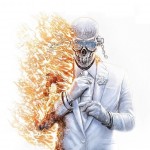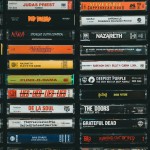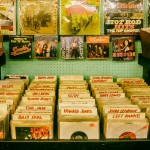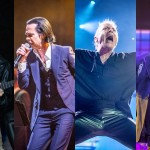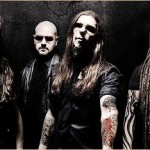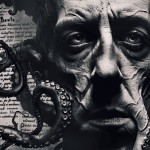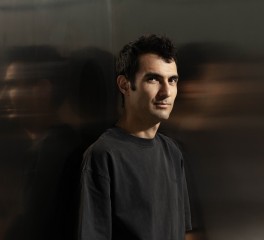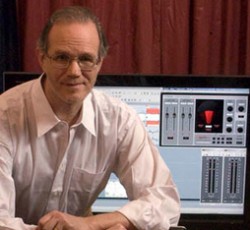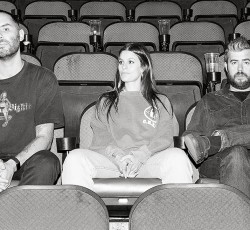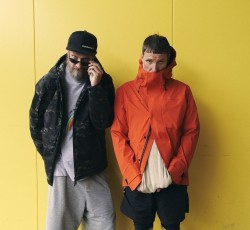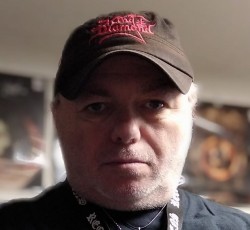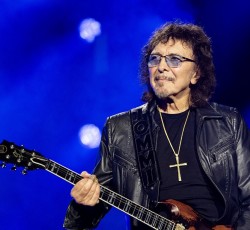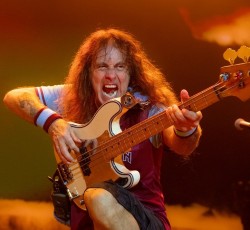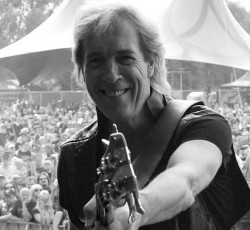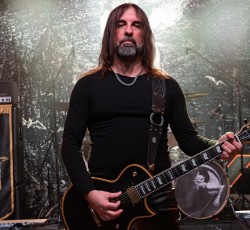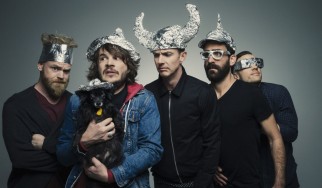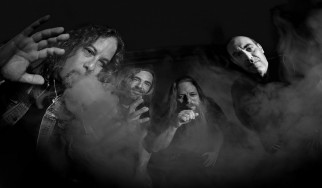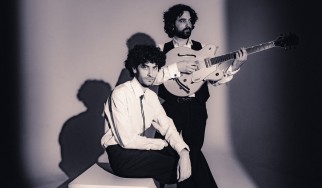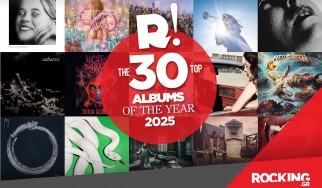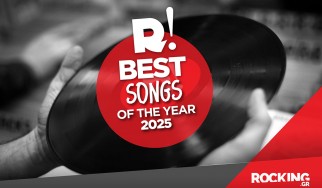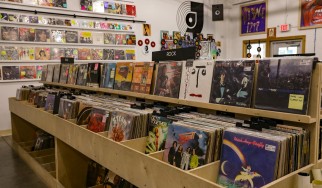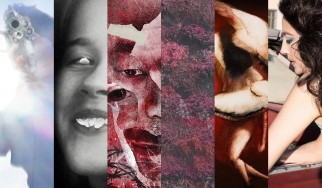Tigran Hamasyan: "The spiritual aspect is much needed in the world we live in"
An interview with the great jazz artist about "The Bird Of A Thousand Voices"
There are some music albums that leave you no choice, but to act fast! And that’s what happened with the upcoming album of the jazz/fusion/prog artist Tigran Hamasysan, called "The Bird Of A Thousand Voices". Of course, Tigran is an already established artist in his field, but in our opinion he reaches new heights with his latest creation. Based on an ancient Armenian tale, Hazaran Blbul, which we highly recommend you should read as well, the album is just a part of a bigger transmedia project, including an online video game, a musical-theatrical show, a series of films and an art installation.
All of the above led two enthusiast writers of Rocking to chat with Tigran, having too many things to ask. On the other side was a wonderful, calm and easy going artist, who had many great things to share with us about music, religion, Hazaran Blbubl, Meshuggah and Miles Davies, the responsibility to treat with respect an ancient tale, Greek music, and even if he unsuccessfully tried to be a thrash metal guitarist when he was really young, among many interesting topics. Of course, we didn’t even manage to ask half of the things that we’d like to ask, but then again we’re grateful for having the chance to talk with such a beautiful human being. Enjoy our conversation and don’t miss the chance to listen to "The Bird Of A Thousand Voices", coming out on August 30th.

Hello Tigran! How are things going? How are you?
I'm well, I'm just doing a few concerts in Europe. I can't wait to get back home and to continue exploring some music. I'm working on some new things now, trying to get back into it. Some things that I have abandoned a while ago.
Your new music hasn’t even been released out to the world and your mind is already working on even newer music…
Yeah, it's an ongoing process to be honest. And this album, it's been four years in making. I mean, the music was pretty much ready, but it took a while to get all the other elements of this project to be ready for the release. So, I've been basically waiting for this album to come out for four years, which for my standard is a long time.
I would like you to take us back to the time you first discovered this beautiful Armenian tale and what were your initial thoughts and feelings about it. How did you decide to make it a music album and then to expand it to a transmedia project? If you could take us back to that…
It was I think 2019, end of 2019, when I was reading a book by this Armenian musicologist, contemporary classical composer and writer. He's a very interesting guy and he has this book about a lot of things. It's like a huge book. And I was reading it because there's some interesting things about medieval music. And somehow I stumbled upon this tale in this book. And I was like "What is this? How could have I not known about this as an Armenian?" you know… And it really shocked me. It made a really big impact on me, because it was such a deep, involved story. It wasn't just like a little tale, you know fairy tale or something. It was this big journey of a hero. And above all, the main theme is bringing resurrection and awakening to the soul by this mythological bird’s song which involved music. Whether it's music or whether it's frequency or whatever it is. But, just the fact that it was evolving around the idea of sound and music, it really made a big impact obviously on a musician. And so I don't know, something happened… I started writing… I got inspired to write music for it, not knowing even what final product will be obviously. I just got inspired to write music.
And at the time I was also starting to explore a lot of ambient, electronic things, incorporating analog synths into my compositions. So, in a fairly short amount of time I got at least a bunch of material ready with more heavier songs ready to record. And at some point I called Nate Woods and told him "Hey man, I have a bunch of new music and I would like to record it". And he we found the time, which was March of 2020. So, we went to Nate's father studio. He has an incredible home studio in Laguna Beach, in California. And so Nate flew from New York, so we can record this. We had five days in total, actually 4 1/2 days to finish this thing. And on the third day the news about COVID spread… it was all over as you remember. And basically they said that they're going to close the country down and nobody can fly like in two days. So, we basically pretty much finished whatever we wanted to do, and Nate found a flight a day earlier to get back to New York. This was the environment when we're doing the recording.
And then the lockdown happened and I was pretty much on my own, just adding layers. I sent it to Mark to record bass on it. And Areni (Agbabian) recorded the vocals on it. And I build the rest in in my home studio. I learned how to use Ableton and started recording with some mics the whole thing.
It was a long process, huh? The recording…
Long. Yeah, yeah, yeah. It was the longest process for an album for me.
My job is not to really tell the story, but to tell it through my own world and the through the eyes of a composer, a pianist that’s living in the 21st century
An adventurous work of art with an adventurous process to be made. So what were the made the major challenges and most the most challenging things you faced during the making of this album and this long process?
It was for sure the fact it was the first time that I was writing music for let's say a libretto. Before that, I gave some ideas like stories to my songs or an ideology to an album, bit this time around, you're writing music for a story that existed for thousands of years, so it's a lot of responsibility. And it's endless search, you know? And I I've never experienced that. I mean, I've experienced it a little bit, in a sense, when I was providing music for film, because that's also you're writing music for something, to an extent. But, yeah, this time around I chose this story and the challenge was "Am I doing this right with the compositions? Like, how much of the essence of the story am I portraying in the music?" This kind of questions… broad and deeper questions, I guess.
But at the end of the day, I also understood that the story is there for everybody to read, and there's many versions. My job is not to really tell the story, but to tell it through my own world and the through the eyes of a composer, a pianist that’s living in the 21st century. So, that's very important. For me it was important to understand that it’s a newer representation, let's say. And it's more not about telling the entire story, but telling it in a way that's accessible to my fans around the world who listen to all kinds of different music. But also there is a larger, very important story for them to discover. That's the way I look at it.
As you say, this album is more of a soundtrack really. I mean, besides the usual elements we can expect from an album, like the Jazz and the progressive and the and the folk aspect, this time it's way more cinematic. It has a lot of ambient tracks. It has a lot of repeated motifs that travel throughout the album, so, as you said, it's a completely different compositional process.
Right!
Do you think that the actual concept made you discover and explore new ideas and things that you wouldn't traditionally do, like electronic music? That’s the first question…
Yeah, for sure. Yeah, of course!

And the second question is, do you prefer this kind of compositional process or would you prefer to just write music freely like when a song is done and you move to the next one, you know…
Hmm. Yes, it's both. I mean, it's very hard and also it's really challenging. And at the same time, like I said, there's more responsibility that comes with that, knowing that it's an ancient tale and you're writing, let's say a rock opera or whatever for it. But at the same time there is already the structure for you. When I do an album, I spend a lot of time thinking about the concept behind it, besides the musical concept obviously. The music is there, it's already written usually. But, there’s a concept and an ideology there behind that, with the overall storytelling of the album, the song names, etc. I spend a lot of time exploring that and understanding what I want to do and what I want to say as an artist, living in this world right now. So, in that way it was a little bit easy, let's say. Because "here's the concept here is the story. Now you interpret it in your own way". But at the same time, it's a huge challenge and also there's all these different late motifs, that you actually you mentioned, that are developing throughout the 90 minutes of the piece and it's also hard to… it's a long process to actually do that… You're almost thinking about an opera or creating a symphony, something like that.
The emotional impact of music has to always be not dominant, but in balance with the mind aspect and the bodily aspect. If these things are in balance, you can have a big impact with the music
Now, first of all, this album a total experience. Both me and Adonis have read this story and it's very touching. And it's also important when you listen to the album. So, of course, it's a work that's made to be appreciated better in its entirety. But then again I can't help mentioning the fact that it was the third single you released, "The Curse", that when I heard it, something happened. Something touched my heart. It's the melody? I don't know what it is… but it really spoke to my heart. How do you think this song manages to do that? Did you feel it too when you wrote the basic theme? How did you manage to have all this sentiment in one song and make it the heartbeat for the album, in my opinion?
Overall, I find that in music, the emotional impact of music has to always be not dominant, but in balance with the rest, like the mind aspect of the music and the bodily aspect of the music. If these things are in balance, you can have a big impact with the music. If any of those things are too much, if emotional aspect is lacking or it's too much, it's not a smart piece. If it's all very basic, like you don’t dive deep into ideas and stuff or if it's all about, let's say, bodily experience, like dancing, then all these things will not lead to a complete something that is an emotional experience or let's say a full experience... I don't know how to really explain it, but I think these things have to be in balance. So, in that sense, I want to create a melody that you will listen and it will have an impact on you. But it's not a simple melody. It's complicated. It's in 15 or whatever, but you don't think about that! It's like putting the complicated within, presenting it in simple meanings. But there is layers of complications behind and underneath that. And the complicated part is never overshadowing the emotional side or the melodic aspect of it. So everything is first of all serving the melodic aspect of it, but the melodic aspect has layers of complications.
I don't know if I explained it in an understandable way… (laughs)… but that balance is very important. It's all about that. There’s a lot of music nowadays that a lot that balance is somehow out. You find it in specific artists who do that, who have that balance. At least that's the kind of music I'm looking for. I can't listen to music that's just, like, super brainy, but there is no emotional connection or aspect to it.
I come from a tradition that melody is so important for me. And I understood this when I was a kid. I guess I'm lucky enough to have discovered Armenian folk music and folk music in general when I was like 13-14. And this idea of the importance of the melody is rooted in me. But at the same time, there's a lot of people who grew up with incredible cultural background and have all these baggage of beautiful melodies, but then what you do with these melodies is that matters. That's those are the layers, those are the complicated layers which you create too, but never to overshadow the melody. That's the whole thing. It always serves the melody. You have to do it in a way that it serves the melody and never get complicated for the sake of presenting an idea. Ideas should be there, even hidden, so you don't even notice those ideas, but it's there…
I don't think you can ignore this story and just pass by it. If you come across it and you read, it will make an impact on you
Let's leave the music for a while. The next question I guess is a bit more spiritual or a bit more social or both. I want to ask you about the actual story of the album, the story of the tale, which is a very-very powerful and a very spiritual and a very hopeful story. So, I wanted to ask you in what ways can this story be important or relevant in the world we live in, at the moment. Whatever happens in the world, in what ways do you think the story is important?
Thank you for the question.
You're very welcome.
This is a very, very good question, because I think anybody that comes across this story… I don't think you can ignore this story and just pass by it. If you come across it and you read, it will make an impact on you. It's one of those stories.
In the materialistic world where we live, the spiritual aspect is much needed in my opinion
I totally agree…
Yeah! It's about a spiritual journey. It's about changing, spiritual awakening and going on a big journey. But, once you enter there, it's like an invitation to a spiritual journey. That’s what it is. And that, in my opinion, has always been a need in any period in the history, especially now. I mean, we live in a materialistic world, dominated by the idea of materialism. And it speaks to people… Just because it's a folk tale, cause it was told by storytellers. People, nowadays, are afraid of religion… Let's just face it. I mean, younger generation people, it's hard for them get to the point, to go to a church. Even if you grew up in a family, that your parents are going to the church and then you grow up religious, you don't necessarily understand or feel things the way they do. And there's also the other thing… If you don't grow up in a religious family, but you live in a country that has a certain religion, a religious culture. And in that case also, it's hard to come to the fact that you understand the value of it and maybe go to church.
So, in the world where we live, I would say the spiritual aspect is much needed in my opinion. And it's a story that was told by storytellers; it’s not a religious story. It was told in the village by the fire, by this great storyteller that was talking about a spiritual journey in more metaphorical ways, which was helping people to go get through really tough times. That was the whole purpose of it. So, it really correlates to and is urgent for the world that we live in now. I think it's a story that speaks to a lot of people.
There has to be a sacrifice in order for you to have an awakening and this unconditional love. Those are things that matter for me. And those are things that I work on myself
It’s totally a spiritual story. There is spirituality in it. And I was thinking that there is something that connects Armenians and Greeks, it’s religion and that's no secret. And there is also something that relates spiritualism and religion in a way, or maybe the aspects that you take from both of them. So, did you experience this procedure like a religious affair? Was it a religious experience for you as well? You know, contemplating the story and maybe interpreting it into your own life and experiences?
For sure! I mean, I can I can definitely say that my life is not the same since I discovered this story. It's really made a big impact on me and it will stay with me until the end of my days. It's something that's always a reference for me, because it's all about the hero who's doing good for the world, without expecting anything in return and he's willing to sacrifice things for it. I mean, that's in the basis of the Christian religion also, and it correlates with a lot of other religions. There has to be a sacrifice in order for you to have an awakening and this unconditional love. Those are things that matter for me. And those are things that I work on myself. I realize how bad I am. And so this is like a role model, this hero who's doing all these things and restoring harmony to the world upside down. It's a role model like the heroes... And it could be a role model for our days.
Going back to music, since me and Chris, we are very much rock and metal fans as well, besides jazz…
Uh-huh. Awesome!
I like the heaviness! I like the sound of heavy riffs, but with clever and some deep ideas behind it…
…we would like to ask the question everybody is asking. So everybody speaks about that heavy prog kind of feeling that your music sometimes carries. Do you feel like you have been influenced by progressive rock music and metal music and especially Meshuggah that a lot of people always relate your music with?
Right! Yes, I have been influenced by certain bands, but I don't listen to a lot of progressive metal. That's the thing. I only listen to a few bands, really. Meshuggah is one of them for sure, but also Car Bomb. I don't know if you're familiar with them. I think they're like one of the greatest bands ever! I'm a big fan of Tool, also. Early System Of A Down records… But, I also grew up listening to Led Zeppelin, it's also my one of my favorite bands.
Yeah, I like the heaviness! I like the sound of heavy riffs, but with clever and some deep ideas behind it, you know? But I like that heaviness! I don't know, I can't explain… I guess it has to do something with the fact that I grew up listening to rock. My dad was a rock fan, so I grew up with that music. But at the same time, I grew up also with jazz. My uncle was with the jazz influence. So, it’s both these things. I like also, for example, Led Zeppelin's music and also Meshuggah and Tool. I can compare that to Miles Davis’ Quintet period from like the mid-60s, with Tony Williams, Ron Carter, Herbie Hancock…
I see what I like in both these musics, which is the epicness of it. It's like the storytelling and the dramaturgy and the epic buildups. Look at Miles Davis’ "My Funny Valentine" live, they're just playing standards, but ust the drama towards it, it's like listening to a symphony. And when you listen to "My Funny Valentine", it gets to a place where it explodes and then it's like really quiet. All this storytelling I would say is also present in Led Zeppelin's music and Tool’s music, where it's like slow build ups and then it explodes and then it goes back … that epic aspect. I like that epicness of it. I mean I understood it recently like "why am I into this and not into that?". For example, specific things, So, I like the heaviness, but I like the storytelling behind it and for me the harmonic aspect is very important. And I think that's why I don't listen to a lot of metal bands. I prefer to listen to Shostakovich. But, I do listen to a few metal bands…

Yet, I don't know if you've checked your Wikipedia page recently, because it mentions that as a kid you wanted to become a thrash metal guitarist. You know, is this fiction? (laughs)
Well, whoever wrote that, I never actually said that… as a kid I wanted to play guitar, but I guess I chose piano, because I never got good enough at the guitar to continue. But yeah, of course… I mean, what I'm doing on the piano, technically should be played on a guitar… (laughs)
I'm a huge fan of Greek church music, like Byzantine chant and all that
I would like to ask you something a bit different. I don't know if you are aware that generally there are many Armenian musicians in Greece and that traditionally our two countries always seemed to share a lot, musically and culturally…
Right…
Are you aware of that generally?
I'm a huge fan of Greek church music, like Byzantine chant and all that. So, I see the similarities and the connection for sure there. I've explored some Greek folk music, but I don't know a lot about it unfortunately. Like, when I hear Greek music I know it's for sure it's Greek folk music, but I don't know details. I don't know deep enough. But Byzantine chants… Yes! I mean I listen to it all the time.
These are things that you would like to integrate to your music, right? Like besides Armenian folk....
Yes, I mean, it's a huge inspiration!
I'm not doing at all what Serj does as far as activism and politics go. I’m actually the opposite. I stay away from that, because you have to be very strong to get into that and not go crazy
Now, what about your collaboration with Serj Tankian in his "Jazz-Is Christ" album a few years ago? Since you and System Of A Down are somehow the voices of Armenia in the outer world, through your art and your music, would you consider doing something else with him? Also, did you find any common musical ground during your collaboration with Serj?
As I mentioned, I'm a fan of early System Of A Down records. When Serj called me to do this experimental jazz album I was in LA, and he was living in LA, so I was super happy and honored that he found out about me and called me. Yeah, we did share for sure some musical ideas and other ideas in life. He's a really beautiful person and doing a lot for speaking… You know, he's a big activist obviously, very political. But in that sense, I'm not like him, I'm not doing at all what he does on that front, for example as far as activism and politics go. I’m actually the opposite. I stay away from that, because you have to be very strong to get into that and not go crazy.
But, I really enjoyed meeting Serj and we had a lot of fun doing these few pieces on "Jazz-Iz Christ". And we've stayed in touch. He likes some of the music that I make… And maybe there will be other projects, yeah…
It's important for me to come back and play in Greece and stay connected with all my audience there
That would be great! So, when should we expect to see you back in Greece? If I'm not mistaken, it was in 2018 that you that you came for the last time here, when you played in Megaro. So is there any chance to come back and especially bring this new stage show that we saw in the recent video from Holland? It was mind blowing. Don't know if you have any information or indication...
You know, we're trying... I really-really want it. You know, my manager is also Greek, but you know born in the US. We've talked about how it's important for me to come back there. I really want to play in Greece and stay connected with Greece and all my audience in Greece. Hopefully, it will happen. It takes some time I guess, but we're working on it for sure.
If we can help to make it happen in any way, we'd be more than happy to do that…
First of all, this project is in its way… It's already challenging for promoters, who are used to my music, to grasp it, because it has all this transmedia side and people don't understand it. But now that we have the videos, it will be more clear to promoters of what it is, and so hopefully we'll make it to Greece very soon.



